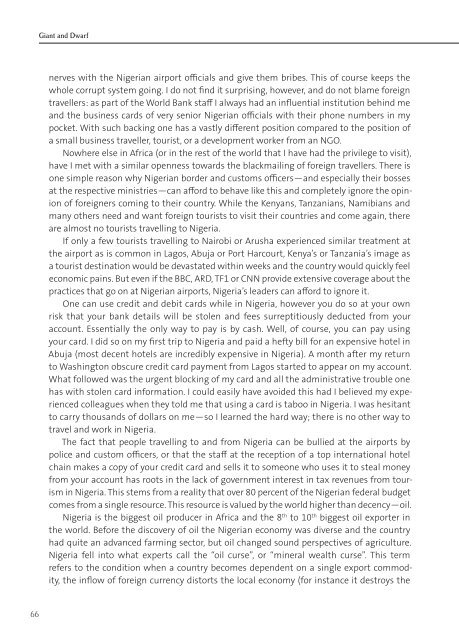Giant_and_Dwarf-FIN
Giant_and_Dwarf-FIN
Giant_and_Dwarf-FIN
You also want an ePaper? Increase the reach of your titles
YUMPU automatically turns print PDFs into web optimized ePapers that Google loves.
<strong>Giant</strong> <strong>and</strong> <strong>Dwarf</strong>nerves with the Nigerian airport officials <strong>and</strong> give them bribes. This of course keeps thewhole corrupt system going. I do not find it surprising, however, <strong>and</strong> do not blame foreigntravellers: as part of the World Bank staff I always had an influential institution behind me<strong>and</strong> the business cards of very senior Nigerian officials with their phone numbers in mypocket. With such backing one has a vastly different position compared to the position ofa small business traveller, tourist, or a development worker from an NGO.Nowhere else in Africa (or in the rest of the world that I have had the privilege to visit),have I met with a similar openness towards the blackmailing of foreign travellers. There isone simple reason why Nigerian border <strong>and</strong> customs officers—<strong>and</strong> especially their bossesat the respective ministries—can afford to behave like this <strong>and</strong> completely ignore the opinionof foreigners coming to their country. While the Kenyans, Tanzanians, Namibians <strong>and</strong>many others need <strong>and</strong> want foreign tourists to visit their countries <strong>and</strong> come again, thereare almost no tourists travelling to Nigeria.If only a few tourists travelling to Nairobi or Arusha experienced similar treatment atthe airport as is common in Lagos, Abuja or Port Harcourt, Kenya’s or Tanzania’s image asa tourist destination would be devastated within weeks <strong>and</strong> the country would quickly feeleconomic pains. But even if the BBC, ARD, TF1 or CNN provide extensive coverage about thepractices that go on at Nigerian airports, Nigeria’s leaders can afford to ignore it.One can use credit <strong>and</strong> debit cards while in Nigeria, however you do so at your ownrisk that your bank details will be stolen <strong>and</strong> fees surreptitiously deducted from youraccount. Essentially the only way to pay is by cash. Well, of course, you can pay usingyour card. I did so on my first trip to Nigeria <strong>and</strong> paid a hefty bill for an expensive hotel inAbuja (most decent hotels are incredibly expensive in Nigeria). A month after my returnto Washington obscure credit card payment from Lagos started to appear on my account.What followed was the urgent blocking of my card <strong>and</strong> all the administrative trouble onehas with stolen card information. I could easily have avoided this had I believed my experiencedcolleagues when they told me that using a card is taboo in Nigeria. I was hesitantto carry thous<strong>and</strong>s of dollars on me—so I learned the hard way; there is no other way totravel <strong>and</strong> work in Nigeria.The fact that people travelling to <strong>and</strong> from Nigeria can be bullied at the airports bypolice <strong>and</strong> custom officers, or that the staff at the reception of a top international hotelchain makes a copy of your credit card <strong>and</strong> sells it to someone who uses it to steal moneyfrom your account has roots in the lack of government interest in tax revenues from tourismin Nigeria. This stems from a reality that over 80 percent of the Nigerian federal budgetcomes from a single resource. This resource is valued by the world higher than decency—oil.Nigeria is the biggest oil producer in Africa <strong>and</strong> the 8 th to 10 th biggest oil exporter inthe world. Before the discovery of oil the Nigerian economy was diverse <strong>and</strong> the countryhad quite an advanced farming sector, but oil changed sound perspectives of agriculture.Nigeria fell into what experts call the “oil curse”, or “mineral wealth curse”. This termrefers to the condition when a country becomes dependent on a single export commodity,the inflow of foreign currency distorts the local economy (for instance it destroys the66


